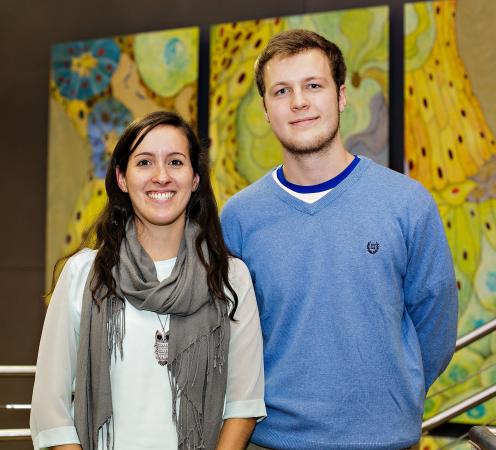It’s taken a healthy dose of enlightened self-interest for Giuliana Salazar-Noratto to succeed as a mentor in the Petit Undergraduate Research Scholar program. She’s helping to guide a next generation scientist while becoming a better scientist in the process. Then again, this notion of ultimately serving your own self-interest by advancing the interest of others is kind of the job description.
“I needed help with my project, and I’ve always liked being a mentor, encouraging people to get into the sciences – even to switch majors,” says Salazar-Noratto, a National Science Foundation doctoral fellow in the Walter H. Coulter Biomedical Engineering Department (BME), pursuing a joint Ph.D. in the Georgia Institute of Technology and Emory University.
“I enjoy showing someone how cool biomedical engineering is, and how cool it is to do something that can ultimately save lives. When I was an undergrad, I worked with a postdoc on research and she guided me through the learning process, helped me develop a deep love of science, and gave the things we were doing more meaning, so I wasn’t just mindlessly doing experiments,” says Salazar-Noratto, who gets a talented and eager lab partner, Petit Scholar Destiny Cobb, in the process.
The Petit Scholars program brings a scholar together with a mentor for one year of research, and they’re typically paired based on mutual research interests. Salazar-Noratto and Cobb are working to develop animal models to better study osteochondritis dissecans, a rare joint disorder that predominately affects the knees of adolescents and young adults, in the lab of Robert Guldberg (executive director of the Parker H. Petit institute for Bioengineering and Bioscience and professor in the Woodruff School of Mechanical Engineering).
“The great benefit to me is I have someone helping me with the project, which definitely needs multiple hands, and also, a different point of view helps,” Salazar-Noratto says. “Bringing in a teammate means bringing in a different point of view, so maybe she’ll catch something that I don’t catch. One of the greatest lessons I’ve learned in how to be a mentor has been learning to realize that people work differently from each other, like, maybe I’m more efficient in the morning and she’s more efficient in the afternoon. One of the great challenges – and it doesn’t just apply to being a mentor, but just being a leader – is learning how your teammates work. So this has been a great learning experience for me.”
Mentors tend to take a pragmatic point of view at the start, according to Tom Barker, a Petit Faculty Fellow and associate professor in the Wallace H. Coulter Department of Biomedical Engineering (BME), who recently began his first year as faculty advisor to the Petit Scholars program. In other words, the road to becoming a mentor begins with the easiest, most practical of reasons.
“I decided to apply to become a Petit Scholar mentor because I had a good project in mind that I couldn’t dedicate enough time to,” says Maria Restrepo, who is mentoring Jake Sebring in the lab of Ajit Yoganathan (associate chair for research, Regents’ professor and the BME’s Wallace H. Coulter Distinguished faculty chair in Biomedical Engineering). Their research is focused on using surgical planning tools developed there in Yoganathan’s lab to help clinicians find the best options in treating children with complex congenital heart defects.
“I wanted a good undergrad that could take care of it, and was very lucky to get Jake, because he’s a hard-working student and has exceeded my expectations,” says Restrepo, who will finish her Ph.D. in December and will begin her career in industry as a software engineer for Gaumard (www.gaumard.com), a company in Miami that makes medical simulators to train clinicians.
Salazar-Noratto isn’t certain yet where her path will lead, beyond a laboratory. She may be a professor, or she may enter industry, but says that either way she’ll be a research scientist working in translational medicine. The mentoring experience, Barker says, can only help figure out which direction Salazar-Noratto and her fellow lab-dwelling grad students will follow, or whether they’re on the right career path to begin with. Along the way, though, there’s the opportunity to help develop a new generation of scientists and biotech leaders.
“In my opinion, the most important role that mentors play in the Petit Scholars program is grooming the next group of great grad students, who might become the next group of great scientists,” Barker says. “We’d love for our Georgia Tech undergrads to become the most highly functioning graduate students wherever they go from here. We want faculty at other universities to look at Georgia Tech as a hotbed of great student recruits. If we can accomplish that, we get more high quality applications for the scholarship, we get more high-quality mentors that want to be part of it. And there’s a level of prestige in being a great mentor to a future great scientist.”
Media Contact
Jerry Grillo
Communications Officer II
Parker H. Petit Institute for
Bioengineering & Bioscience
Keywords
Latest BME News
Jo honored for his impact on science and mentorship
The department rises to the top in biomedical engineering programs for undergraduate education.
Commercialization program in Coulter BME announces project teams who will receive support to get their research to market.
Courses in the Wallace H. Coulter Department of Biomedical Engineering are being reformatted to incorporate AI and machine learning so students are prepared for a data-driven biotech sector.
Influenced by her mother's journey in engineering, Sriya Surapaneni hopes to inspire other young women in the field.
Coulter BME Professor Earns Tenure, Eyes Future of Innovation in Health and Medicine
The grant will fund the development of cutting-edge technology that could detect colorectal cancer through a simple breath test
The surgical support device landed Coulter BME its 4th consecutive win for the College of Engineering competition.









